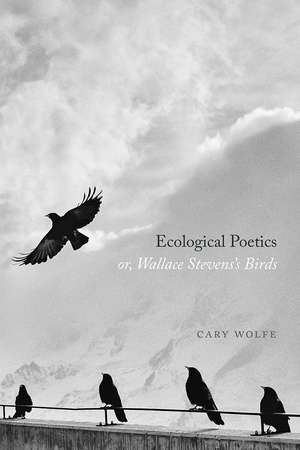Ecological Poetics; or, Wallace Stevens's Birds
Autor Cary Wolfeen Limba Engleză Paperback – 14 mai 2020
Stevens, Wolfe argues, is an ecological poet in the sense that his places, worlds, and environments are co-created by the life forms that inhabit them. Wolfe argues for a “nonrepresentational” conception of ecopoetics, showing how Stevens’s poems reward study alongside theories of system, environment, and observation derived from a multitude of sources, from Ralph Waldo Emerson and Niklas Luhmann to Jacques Derrida and Stuart Kauffman. Ecological Poetics is an ambitious interdisciplinary undertaking involving literary criticism, contemporary philosophy, and theoretical biology.
Preț: 147.13 lei
Preț vechi: 183.74 lei
-20% Nou
Puncte Express: 221
Preț estimativ în valută:
28.16€ • 29.09$ • 23.43£
28.16€ • 29.09$ • 23.43£
Carte indisponibilă temporar
Doresc să fiu notificat când acest titlu va fi disponibil:
Se trimite...
Preluare comenzi: 021 569.72.76
Specificații
ISBN-13: 9780226687971
ISBN-10: 022668797X
Pagini: 232
Dimensiuni: 152 x 229 x 18 mm
Greutate: 0.27 kg
Ediția:First Edition
Editura: University of Chicago Press
Colecția University of Chicago Press
ISBN-10: 022668797X
Pagini: 232
Dimensiuni: 152 x 229 x 18 mm
Greutate: 0.27 kg
Ediția:First Edition
Editura: University of Chicago Press
Colecția University of Chicago Press
Notă biografică
Cary Wolfe is the Bruce and Elizabeth Dunlevie Professor of English and founding director of 3CT: Center for Critical and Cultural Theory at Rice University. He is the author of five books, most recently, Before the Law: Humans and Other Animals in a Biopolitical Frame.
Cuprins
Preface: “An Affair of Places”
Part 1. Reading Stevens, Once More
Chapter 1. Poems (and Critics) of Our Climate
Chapter 2. “Like Seeing Fallen Brightly Away”: A New Theory for the Emerson/Stevens Genealogy
Part 2. From Epistemological to Ecological Poetics
Chapter 3. “There Is No World”: Deconstruction, Theoretical Biology, and the Creative Universe
Chapter 4. “Never Again Would Birds’ Song Be the Same”
Part 3. “Farewell to an Idea”: Some Later Long Poems
Chapter 5. Scapes and Spheres
Chapter 6. “Premetaphysical Pluralism”: Dwelling in the Ordinary
Coda: Indirections, on the Way
Notes
Index
Part 1. Reading Stevens, Once More
Chapter 1. Poems (and Critics) of Our Climate
Chapter 2. “Like Seeing Fallen Brightly Away”: A New Theory for the Emerson/Stevens Genealogy
Part 2. From Epistemological to Ecological Poetics
Chapter 3. “There Is No World”: Deconstruction, Theoretical Biology, and the Creative Universe
Chapter 4. “Never Again Would Birds’ Song Be the Same”
Part 3. “Farewell to an Idea”: Some Later Long Poems
Chapter 5. Scapes and Spheres
Chapter 6. “Premetaphysical Pluralism”: Dwelling in the Ordinary
Coda: Indirections, on the Way
Notes
Index
Recenzii
“In this remarkable and elegant book, Wolfe achieves a stunning account of the inhumanness, the ‘strange planetary impersonality’ of Stevens’s poetry. Ecological Poetics carves out a new space for study within the general field of ecopoetics, focusing on a kind of poetry that reproduces rather than represents the peculiar logic of many biological, physical, and computational systems. Wolfe delivers a powerful new engine for thought, one that we can add to our repertoires of critical ideas and methods and apply to the larger cultural topic of environmentality.”
“The Stevens that emerges in Ecological Poetics is a new and very different animal from the one we thought we knew. We come to understand him as concerned with the embodied, the finite, the fragile, and the concrete, rather than preoccupied with abstract concepts and an idealist aesthetics. Through a series of excellent close readings, especially of his later poems, Stevens becomes the thinker to help us understand the vertiginous logic of the Anthropocene. Wolfe gives us a philosophy of ecological poetics whose ultimate stakes are both ethical and political, instructing us in how we might think poetically in order to effectively resist the destruction of life forms."
"In his new book, Cary Wolfe, a scholar of poetics in the American grain turned bioethicist and thought leader in the new field of posthumanism, cogently and often brilliantly rereads Wallace Stevens as a practitioner of what we might call second-order ecopoetics—a poetry that is less interested in describing the natural world than it is in demonstrating and enacting on a stylistic level what Timothy Morton has called “ecological thought.”
"Readers of Ecological Poetics will find an ambitious and passionate call for widening the purview of posthumanism: an inter-disciplinary and rigorously precise posthumanist ecocritical methodology. Wolfe constructs a persuasive and valuable theoretical framework for reconsidering environmentality more broadly and for reassessing the ecological complexity of Stevens’s later works."
